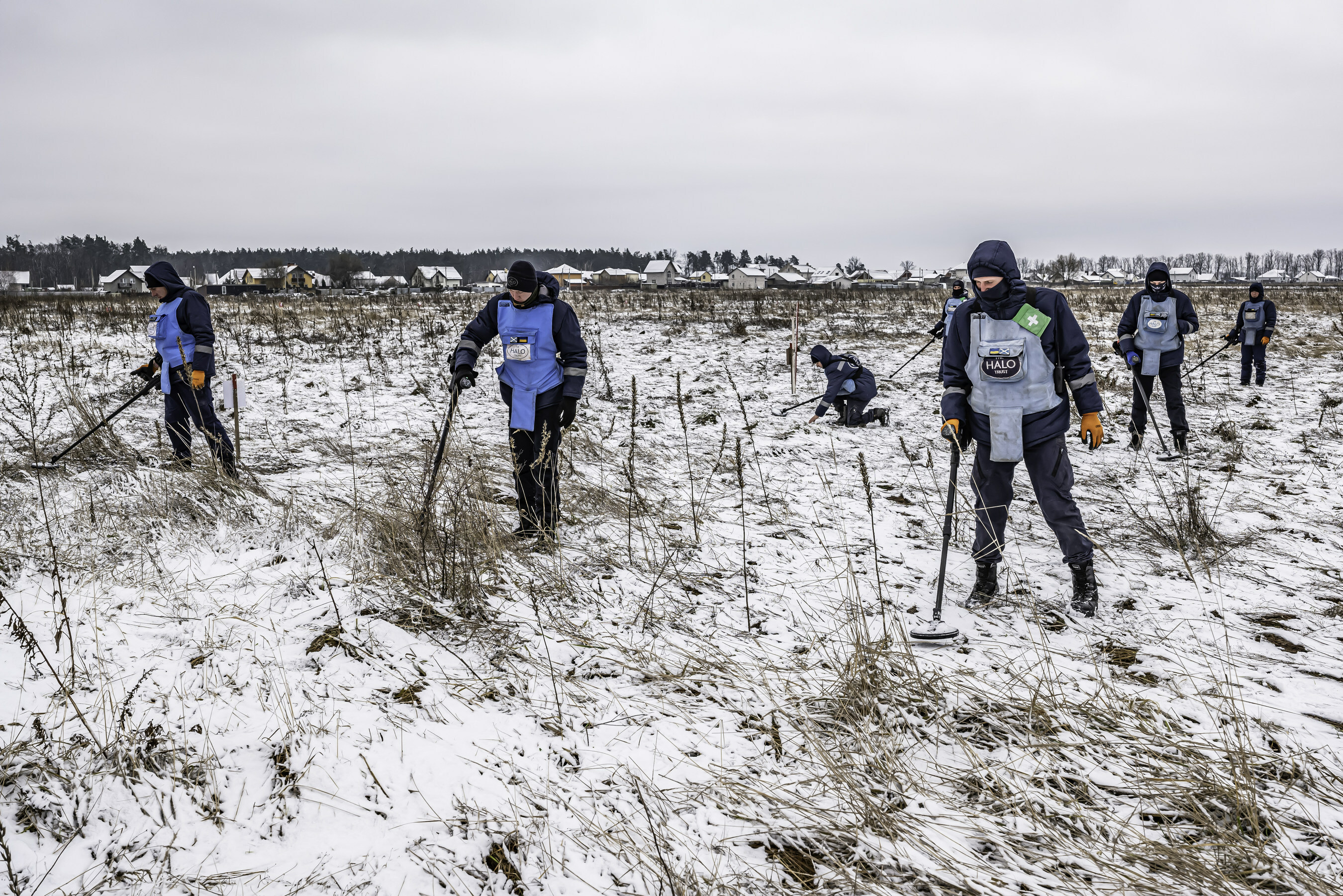The Halo Trust calls for 'Marshall Plan for Mines' for Ukraine

Above:
Bucha, Kyiv Oblast, Ukraine. Staff from the landmine clearance charity The HALO Trust clearing ground of unexploded ordnance (UXO) such as artillery fuses at Bucha, just outside Kyiv Oblast, Ukraine.
© Chris Strickland / HALO
The Ukrainian government estimates that around 40% of Ukraine – around 250,000 square kilometres – may need to be searched and cleared of mines and explosives. This equates to an area larger than the United Kingdom. In addition to anti-personnel and anti-tank mines, tens of thousands of artillery shells are being fired every day - with thousands failing to explode.
Open-source satellite imagery indicates there are minefields that stretch for hundreds of kilometres in the east and the south of the country. One single fortified mine line runs 90km from the Russian border to north of the town of Lysychansk in the east. Other images show multiple lines of Russian fortifications north of Melitopol that zigzag for 300km. Similar fortifications were used on the Cambodian border, where a 700km long mine belt was laid in the 1980s.
HALO's CEO James Cowan said: "The clearance of unexploded ordnance and landmines from Ukrainian land is one of the greatest challenges caused by war in recent history. Lessons from previous conflicts tell us that roughly one day of fighting results in a month of clearance. But the scale of the shelling, the vastness of the territory and the deliberate targeting of major infrastructure means that clearing debris of war in Ukraine will require unprecedented global funding and collaboration between state, private and philanthropic donors. A definitive and coordinated 'Marshall plan for mines' would be a clear call to action for the international community."
HALO is working across Ukraine in partnership with the State Emergency Services (SES), the National Mine Action Authority and its Ministry of Defence.
James Cowan said: "The Ukrainian authorities and its State Emergency Services are delivering an extraordinary response which has saved thousands of civilians. We are proud to be working in partnership with them to clear land, deliver safety messaging to the civilian population and share our machinery and logistics. This vital work will restore Ukrainian livelihoods, agriculture and infrastructure."
HALO established its Ukraine programme in the Donbas in 2016 and relocated its workforce to the Kyiv oblast in April 2022 so its staff could deliver urgent clearance, community awareness sessions and rapid contamination survey in areas that had been occupied by Russian troops, such as Bucha and Irpin. Over the following months, HALO expanded its workforce and established operations in Chernihiv, Kharkiv, Sumy and Mykolaiv oblasts. The organisation aims to have 1,200 Ukrainian staff operating across the country by the end of 2023, as well as establishing a global centre for research and development for complex post-war clearance.
Deminer Yulia Melnyk said: "I am proud that my job as a HALO deminer is helping my citizens stay safe during this dark chapter of our history. But it has also given my family a lifeline at a time we have lost almost everything. On behalf of my Ukrainian colleagues, I would like to thank the Government of the United States of America/Germany/The Netherlands/The United Kingdom/Norway/Canada for their support. But I urge the world not to look away as our country enters a second year of displacement and destruction."
HALO's global headquarters are in Dumfries and Galloway in Scotland with smaller offices in Salisbury in Wiltshire, UK and liaison offices in Washington DC and Brussels.













